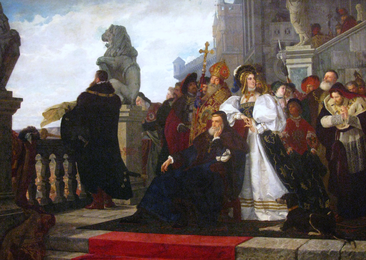- Chicken War
-
This article is about Polish Chicken War. For the Chicken War of the 1960s, see Chicken Tax.Chicken War by Henryk Rodakowski

Chicken War (Polish: Wojna kokosza) is the colloquial name for a 1537 anti-royalist and anti-absolutist rokosz (rebellion) by the Polish nobility. The derisive name was coined by the magnates, who for the most part supported the King and claimed that the "war's" only effect was the near-extinction of the local chickens by the nobles gathered for the rokosz at Lwów, in Małopolska. (The magnates' choice of "kokosz" — it actually means "laying hen" — may have been inspired by a play on words between "kokosz" and the similar-sounding "rokosz.")
At the start of his reign, King Zygmunt I the Old inherited a Kingdom of Poland with a century-long tradition of liberties of the nobility, confirmed in numerous privileges. Zygmunt faced the challenge of consolidating internal power to handle external threats to the country. During the rule of his predecessor, Alexander I, the statute of "Nihil novi" had been instituted, effectively forbidding kings of Poland to promulgate laws without the consent of the Parliament. This proved crippling to Zygmunt's dealings with his nobles and magnates, as well as a serious threat to the country's stability. To strengthen his power, Zygmunt initiated a set of reforms, establishing a permanent conscription army in 1527 and extending the bureaucratic apparatus necessary to govern the state and finance the army. Supported by his Italian consort, Bona Sforza, he began buying up land to enlarge the royal treasury. He also initiated a process of restitution of royal properties, previously pawned or rented to the nobles.
In 1537, however, the King's policies led to a major conflict. The nobility, gathered near Lwów to meet with a levée en masse, called for a military campaign against Moldavia. However, the lesser and middle strata of the nobility called a rokosz, or semi-legal rebellion by the peers, to force the King to abandon his reforms. The nobles presented him with 36 demands, most notably:
- A cessation of further land acquisitions by Queen Bona Sforza;
- Exemption of the nobility from the tithes;
- A cleanup of the Treasury rather than its expansion;
- Confirmation and extension of the privileges of the nobility;
- Lifting of the toll or exemption of the nobility from it;
- Adoption of a law concerning incompatibilitas — the incompatibility of certain offices that were not to be joined in the same hand (for instance, that of a Starosta and of a Palatine or Castellan);
- The carrying out of a law requiring the appointment of only the local nobles to most important local offices; and
- The creation of a body of permanent advisors to the king.
Finally, the protesters criticized the role of Queen Bona, whom they blamed for the "bad education" of young Prince Zygmunt August (the future King Zygmunt II August), as well as for seeking to increase her power and influence in the state.
It soon transpired, however, that the nobility's leaders were divided and that achieving a compromise was almost impossible. Too weak to start a civil war against the King, the protesters finally agreed to what was thought a compromise. The King rejected most of their demands, while accepting the principle of incompatibilitas the following year and agreeing not to force the election of the future king vivente rege, that is, in the lifetime of the reigning king.
Thereupon the nobility returned to their homes, having achieved little.
See also
- Rokosz
- Zebrzydowski's Rokosz
- Lubomirski's Rokosz
Categories:- 1537 in Poland
- 16th century in Poland
- Conflicts in 1537
- Polish rebellions
- History of Poland (1385–1569)
Wikimedia Foundation. 2010.

